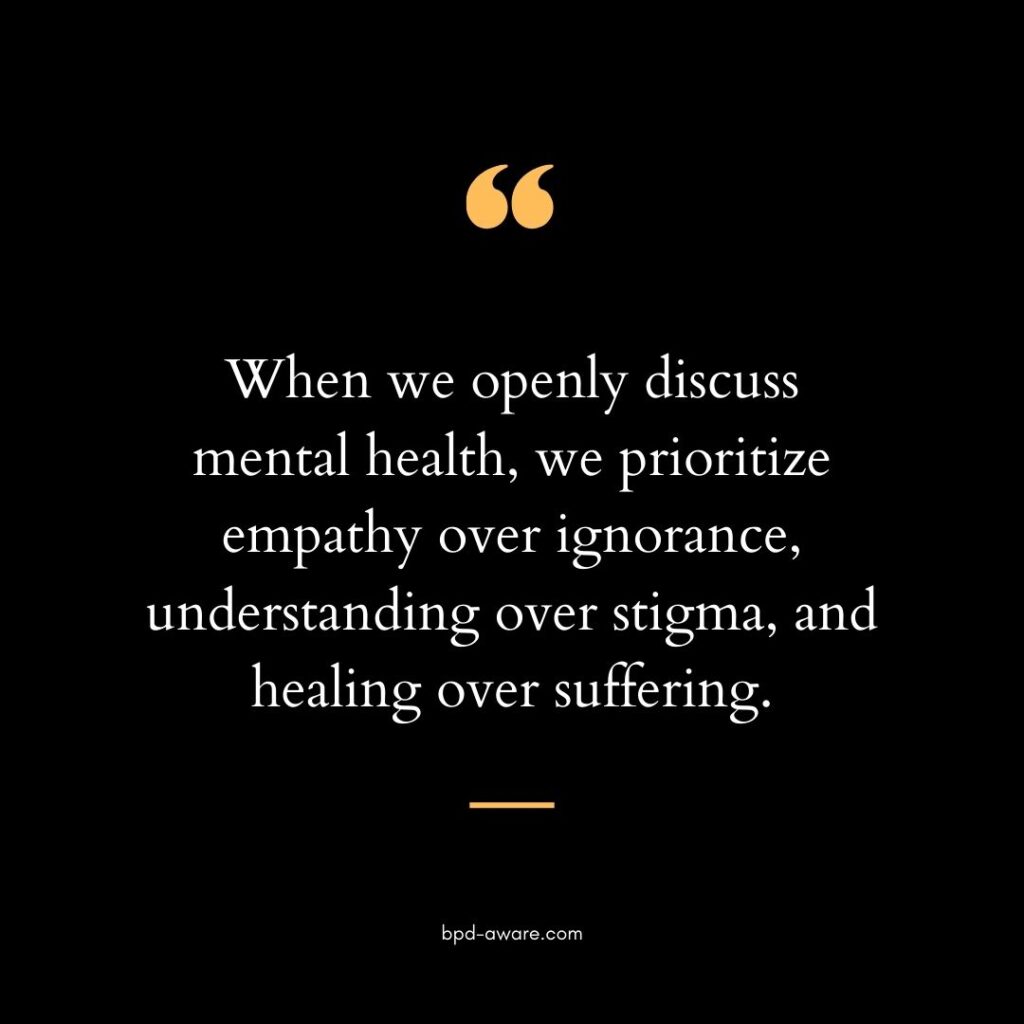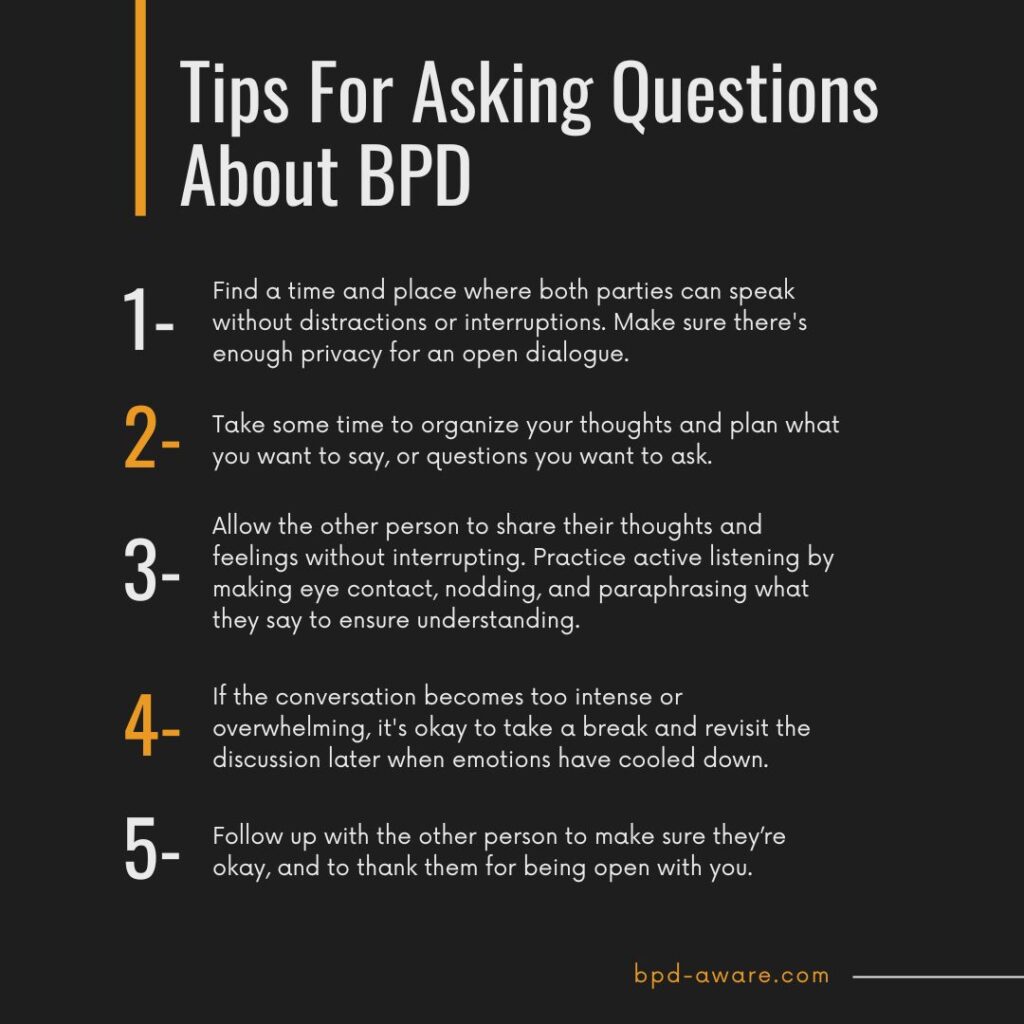If you have a loved one in your life who has Borderline Personality Disorder (BPD), one of the best ways to better understand them and how BPD affects their life is simply to ask them questions. Through this kind of clear and open communication, you can learn things about your loved one that they may have never shared in normal conversation. This is information you can use to better help them through their recovery.
The first thing to note is that it’s best to choose a time when your loved one is in a more stable situation. If they appear to have been struggling recently, it may trigger them to have a conversation that can leave them feeling so vulnerable. Try to find a good time for them and mention beforehand that you have some questions about BPD and how it affects them. This allows the person with BPD time to mentally prepare for the conversation.
You might also want to consider the location where this conversation will take place. Somewhere with more privacy might be a good idea as most people wouldn’t want to share intimate details of their mental health in a place they could be listened in on.

Questions To Ask Someone With BPD
We have created a list of questions that can be good to ask someone with BPD if you want to better understand them. This list is by no means exhaustive but a good framework for you to use. Certain answers to questions might give you a reason to ask follow-up questions, something that would be difficult for us to cover here due to how unique everyone’s situation is.
It should also be noted that you don’t have to ask every question here, and it’s probably a good idea to break these kinds of conversations into several meet-ups so that it doesn’t become too intense for the person with BPD.
Without further ado, here are some good questions to ask someone with BPD to better understand them:
- What symptoms of BPD do you experience? There are nine core symptoms of BPD, but someone only needs to experience five of them to potentially receive a diagnosis. Knowing which symptoms your loved one suffers from can help you better understand what they’re going through.
- How does BPD affect your everyday life? While there are nine core symptoms of BPD, these can present themselves in different ways and affect people in a variety of ways. For example, someone with a fear of abandonment might be very clingy while another person might use avoidant behavior and not put themselves out into the world much.
- What coping strategies or techniques do you use? This question will give you an insight into how the person with BPD support themselves when they’re struggling while also acknowledging the efforts they are making.
- What are your triggers? Sometimes serious BPD episodes can come on without warning, but other times there are definite triggers that cause a person with BPD to suffer a flare-up. Common triggers include feeling ignored or being talked over, being criticized, last-minute cancellations, and being around abusive figures. By knowing these triggers, you can avoid being the cause of a flare-up. Of course, there are many other potential triggers, some of which are deeply personal and your loved one might not share all their triggers with you.
- What are common misconceptions about BPD you’ve come across? This question will give your loved one a chance to educate you about some of the myths surrounding BPD and deepen your understanding.
- How can I support you during difficult times? Asking this question shows that you want to be supportive of your loved one and try to help lift them from their lowest point.
- How do you navigate the balance between seeking support and maintaining boundaries in your relationships? People with BPD often struggle with maintaining boundaries, and many also struggle with asking for support. It’s a tough row to hoe for someone with BPD. This will give you valuable insight into the dynamics of their relationships.
- Are you undergoing treatment? If so, what kind and how are you finding the experience? The answer to this question will give you a lot of vital information to help better understand your loved one and their situation. It might also give them the rare opportunity to discuss their therapy and ask you for your opinions on situations that have occurred within therapy they may want a second opinion about.
- Have you experienced any stigma or discrimination related to your BPD diagnosis? Again, this gives the person with BPD the chance to educate on the difficulties of living with BPD, as well as perhaps allowing them to vent a little.
- Do you have any aspirations for managing your BPD symptoms? Discussing their goals with your loved one will help create a sense of empowerment and agency in managing their condition as well as tell you where they hope to be six months or a year down the line.
- Is there anything else you’d like to share with me about your experiences with BPD? This is a great open-ended question that allows your loved one to share additional information that your questions haven’t covered or they’d not previously mentioned at the time.
As mentioned earlier, with every answer, you may come up with more questions of your own as you find areas that you want to delve into more deeply – and that’s perfectly okay. These questions aren’t a be-all and end-all by any means.
It’s important while asking these kinds of questions to gauge the reaction of your loved one. If they appear to be uncomfortable you should ask if they’d prefer to change the subject – answering these questions can be emotionally taxing. The person with BPD will no doubt appreciate your thoughtfulness and empathy in this situation.

Final Thoughts
Talking openly about mental health issues with someone who has BPD is a great way to educate yourself and show them that you care about their well-being. All too many people avoid talking about mental health issues, which only creates more stigma. By asking questions, you are helping to shine a light on what can be a very dark part of someone’s life, something they might not get the chance to talk about with many people.
By fostering this kind of openness and listening with empathy, you can contribute to a more inclusive and supportive society for people with Borderline Personality Disorder.
Sources, Resources, and Further Reading
- Communicating With Someone With Borderline Personality Disorder: https://www.optimumperformanceinstitute.com/bpd-treatment/communicating-borderline-personality-disorder/
- How To Talk To Someone With Borderline Personality Disorder: https://firstlightrecovery.com/how-to-communicate-with-someone-with-borderline-personality-disorder/
- 10 Questions You Always Wanted to Ask Someone with Borderline Personality Disorder: https://www.vice.com/en/article/10-questions-you-always-wanted-to-ask-someone-with-borderline-personality-disorder/
- What to ask someone with bpd to better understand their personal symptoms?: https://www.reddit.com/r/BPD/comments/1ekh5vx/what_to_ask_someone_with_bpd_to_better_understand/
















